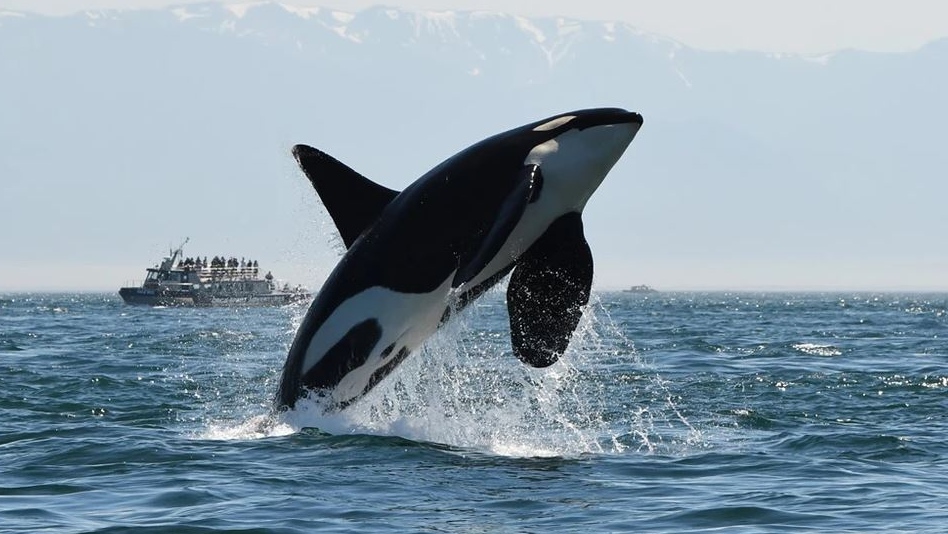Endangered orcas suffered calorie deficit in recent years: UBC study
 Southern resident orca K25 is seen in mid-breach. Researchers now fear the killer whale is one of three endangered southern residents that have died. (Dave Ellifrit/Center for Whale Research)
Southern resident orca K25 is seen in mid-breach. Researchers now fear the killer whale is one of three endangered southern residents that have died. (Dave Ellifrit/Center for Whale Research)
A new study released by the University of British Columbia found that southern resident killer whales (SRKW) did not have enough to eat in recent years, which correlates to higher mortality and lower fertility rates.
The study tracked the critically endangered SRKWs over the past 40 years, and found that they did not get enough to eat in six of those 40 years – three of which occurred in the most recent years of the study, from 2018 to 2020.
On average, adult killer whales were about 28,716 calories short in their diet in the six years that deficits were recorded, or about 17 per cent of their average daily energy requirements, according to the study.
"With the southern resident population at such a low level, there’s a sense of urgency to this kind of research," said lead author Fanny Couture, a doctoral student at the Institute for the Oceans and Fisheries (IOF) and Ocean Wise, in a release Monday.
As of October 2021, the SRKW population numbered about 73 orcas.
CHINOOK SALMON DECLINES
The southern residents feed mostly on Chinook salmon, and when Chinook salmon populations declined, the orcas were affected, the study found.
"The years where southern residents were in an energy deficit are also years where other studies report lower population growth rate and higher mortality rates for the killer whales," said Dr. Villy Christensen, professor at IOF and co-author of the study.
Researchers are uncertain why Chinook salmon populations are declining, though there are several factors, including climate change, disease, and predation by other animals.
Commercial fishing also plays a role, though researchers say Chinook salmon harvesting was reduced in Canada in the late 1990s, and that salmon declines have continued over the past two decades.
"Those declines have continued despite severe fisheries reductions, and one very likely candidate for causing them is the massive increase in abundance of Steller sea lions since the mid-1980s; those sea lions now consume more fish than all the B.C. commercial fisheries for all species, combined," said Dr. Carl Walters, senior author of the study and retired professor at IOF.
MORE FISHING RESTRICTIONS MAY BE NEEDED
Researchers found that when Chinook salmon populations were particularly low, southern resident killer whales would feed on other types of salmon, such as chum. However, their energy deficits would still occur.
Study co-authors say more restrictions on Chinook salmon fishing may still be required to protect both the fish and the orcas, as well as further research into underwater noise pollution.
"Both killer whales and Chinook salmon, the southern resident’s main prey, are important, iconic species for the west coast of Canada," said Couture
"Studying what is happening to the population may help offer solutions, both for the southern residents and potentially other killer whale populations in the future."
CTVNews.ca Top Stories

Why drivers in Eastern Canada could see big gas price spikes, and other Canadians won't
Drivers in Eastern Canada face a big increase in gas prices because of various factors, especially the higher cost of the summer blend, industry analysts say.
How to avoid the trap of becoming 'house poor'
The journey to home ownership can be exciting, but personal finance columnist Christopher Liew warns about the trappings of becoming 'house poor' -- where an overwhelming portion of your income is devoured by housing costs. Liew offers some practical strategies to maintain better financial health while owning a home.
Toxic forever chemicals in drinking water: Is Canada doing enough?
As the United States sets its first national limits on toxic forever chemicals in drinking water, researchers say Canada is lagging when it comes to regulations.
'A living nightmare': Winnipeg woman sentenced following campaign of harassment against man after online date
A Winnipeg woman was sentenced to house arrest after a single date with a man she met online culminated in her harassing him for years, and spurred false allegations which resulted in the innocent man being arrested three times.
Some customers steaming after McDonald's ends free hot drink sticker program
It took years for Vinnie Deluca to collect more than 400 cards worth of free McDonald's McCafe coffee, a collection that now has "zero value" after the company discontinued the program.
Biden scores endorsements from Kennedy family, looking to shore up support against Trump and RFK Jr.
U.S. President Joe Biden will accept endorsements from at least 15 members of the Kennedy political family during a campaign stop in Philadelphia on Thursday as he aims to undermine Donald Trump and marginalize the candidacy of Robert F. Kennedy Jr.
Where did the gold go? Crime expert weighs in on unfolding Pearson airport heist investigation
Almost 7,000 bars of pure gold were stolen from Pearson International Airport exactly one year ago during an elaborate heist, but so far only a tiny fraction of that stolen loot has been found.
When new leaders took over in ancient Maya, they didn't just bury the former royals. They burned their bodies in public
New archeological investigations in Guatemala reveal that the ancient Maya people had a ritual of burning royal human remains as a public display of political regime change.
Party's over: Coyotes play final game as Arizona franchise before move to Salt Lake City
Mullett Arena buzzed like few times in the two years since the Arizona Coyotes moved in, the fans amped for one last desert hurrah.
































